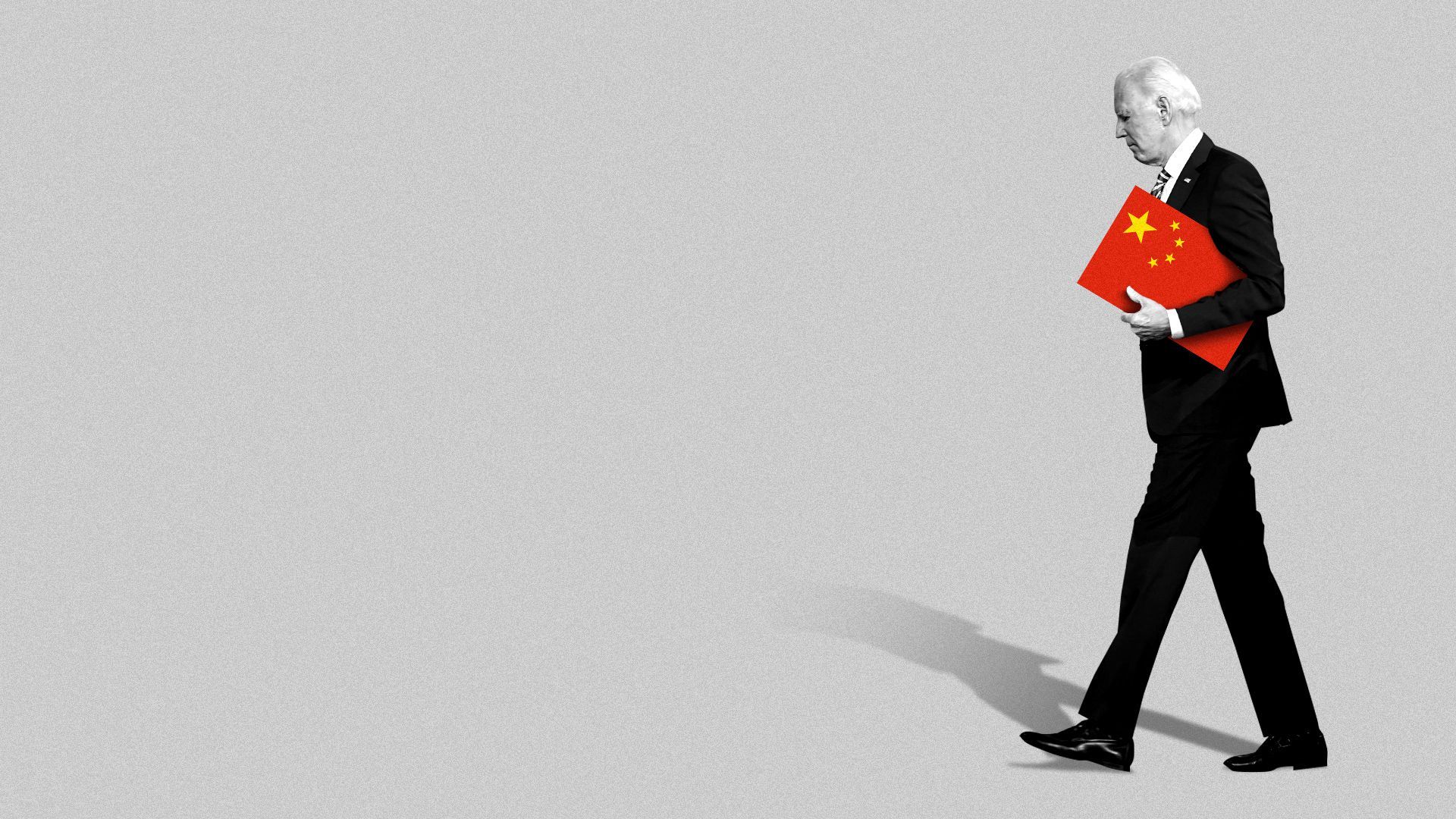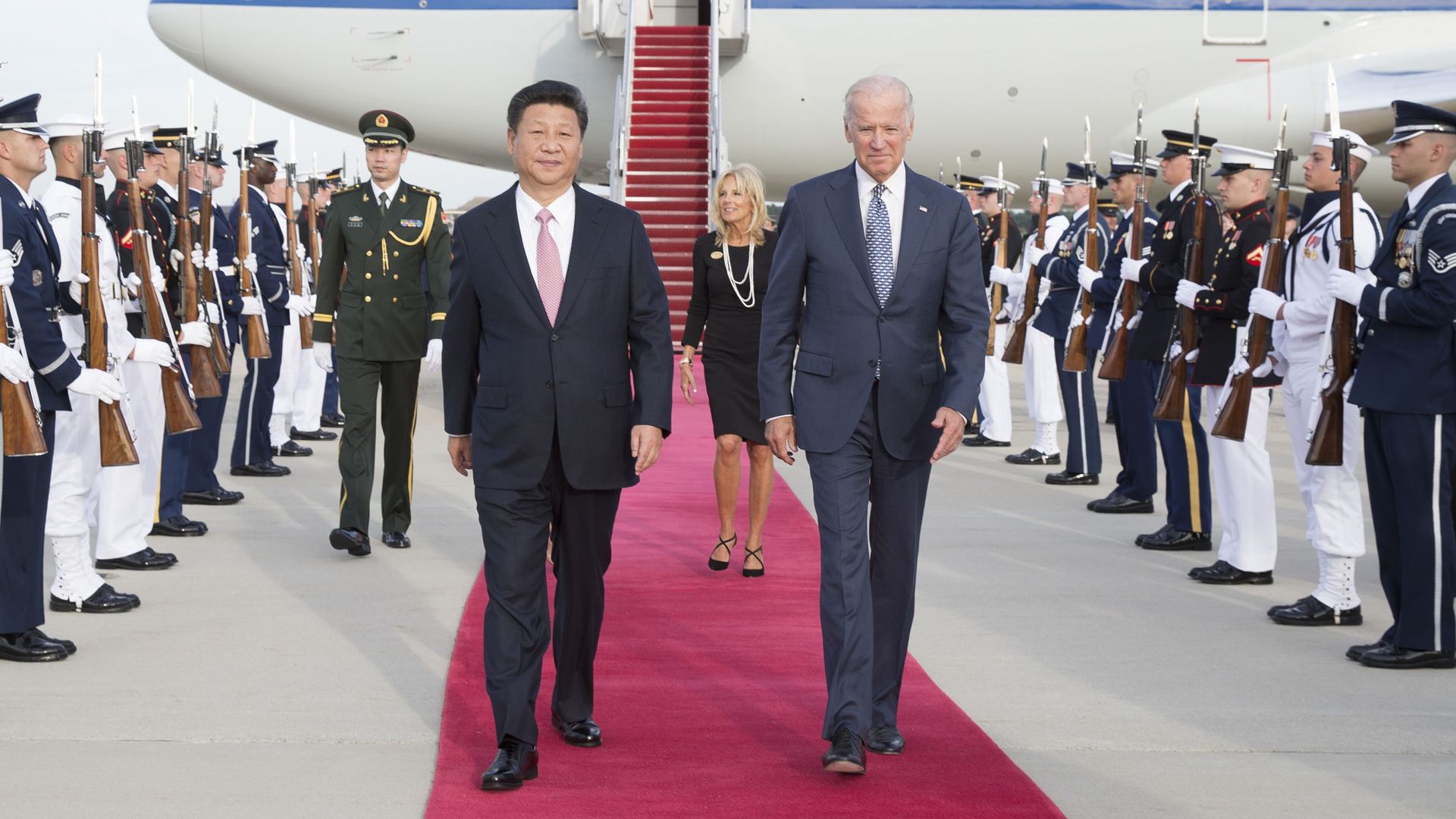| | | | | | | Presented By OurCrowd | | | | Axios China | | By Bethany Allen-Ebrahimian ·Nov 10, 2020 | | Welcome back to Axios China. After two weeks of vacation, I'm back this week with a look at how Joe Biden might handle Trump's China legacy, how Beijing views Biden, and lots more. - For breakings news alerts to keep you updated throughout the day (only the important stuff, we promise!), download the Axios app and follow the China channel.
Today's newsletter is 1,564 words, a 6-minute read. | | | | | | 1 big thing: Trump leaves Biden tough choices on China |  | | | Photo illustration: Aïda Amer/Axios. Photo: Drew Angerer/Getty Images | | | | President-elect Joe Biden isn't likely to pursue a full reset with China, but he quickly must decide which of the Trump administration's many policies to keep and which to scrap. Why it matters: In a world struggling against the common threats of climate change, nuclear proliferation and an ongoing pandemic, the U.S. must find a way to both challenge and cooperate with a rising authoritarian superpower. The Trump White House has pursued a "whole-of-government" approach to countering China's growing power, leaving Biden to preside over agencies that have implemented a dizzying number of China-related initiatives over the past four years. - The U.S. Trade Representative's office has administered hundreds of billions of dollars in tariffs on Chinese imports.
- The Commerce Department has expanded the federal entities blacklist to include Chinese companies and government offices accused of complicity in human rights violations.
- The State Department closed the Chinese Consulate in Houston, placed restrictions on Chinese journalists and media outlets in the U.S., and implemented visa restrictions for some Chinese students and scholars.
- The Justice Department's China Initiative led to a huge increase in investigations into cases of economic espionage and research theft. The DOJ has also pursued investigations into science researchers for undisclosed links to China and prosecuted U.S. and foreign nationals for serving as unregistered foreign agents of China.
- The Education Department launched a major investigation into foreign funding at U.S. universities.
- The Department of Homeland Security placed greater emphasis on investigating supply chains for links to forced labor in China, and on stopping tainted shipments at the border.
- The Treasury Department imposed sanctions on government officials and entities in China and Hong Kong deemed complicit in human rights violations.
Between the lines: Though these policies are largely based on concerns that analysts on both sides of the aisle agree to be legitimate, critics accuse the Trump administration of harsh, clumsy implementation with little concern for collateral damage or disrupted lives. What's next: As Biden decides what to do with each of these policies, he will face two major challenges. The domestic challenge: Biden must address national security concerns without seeming to perpetuate the policies and rhetoric of the Trump era. - This is a difficult needle to thread. Tough China policies are now so closely associated with Trump and his administration's racially charged overtones that the issue has become politically toxic for some Democrats.
- But Biden's top advisers agree China presents an enormous national security risk. "There's a technology competition, a military competition, an economic competition, an ideological competition and a diplomatic competition," Ely Ratner, a possible pick for a senior National Security Council position, told Axios before election night. "It's a big task."
The international challenge: President-elect Biden has signaled he will embrace multilateral initiatives and work together with U.S. allies, a key strategy for blunting the effects of China's more aggressive moves and reshaping its behavior. - But Trump's withdrawal from international commitments and open scorn for allies damaged trust in U.S. leadership, though it's not yet clear if that damage is permanent.
- Dented relationships could make it more difficult for the U.S. to get new potential initiatives off the ground, such as a new multilateral body focused on tech standards, if foreign leaders are less willing to expend their own domestic capital for what might be perceived as a U.S. president's whims.
What to watch: Biden's Cabinet picks will be especially crucial — and unlike with many foreign policy challenges in the past, it's not just the heads of the Defense and State Departments that will matter. Go deeper: Biden's China plan: Bring allies |     | | | | | | 2. What China thinks of Biden |  | | | Vice President Joe Biden welcomes Chinese President Xi Jinping in Washington, D.C., Sept. 24, 2015. Photo: Xinhua/Huang Jingwen via Getty Images. | | | | China's leaders see President-elect Biden as a more predictable, but not necessarily less formidable, U.S. leader. Why it matters: Relations aren't likely to be chummy, but Beijing is hoping diplomacy between the two superpowers can be restored. Leaders in Beijing know Biden may be easier to deal with in some respects and more difficult in others. The Biden administration isn't likely to confront China quite as directly as Trump has, but it is also more likely to bring allies, making U.S. moves harder for China to counter in the long run. Background: Judging by the relative restraint China's leaders have shown amid the Trump administration's full-court press against the country in recent months, Beijing seems hopeful the U.S.-China relationship can improve under Biden. - The Chinese Communist Party has met the Trump administration's boldest moves, such as the closure of the Houston consulate, with equal tit-for-tat responses.
- But leaders in Beijing in other cases haven't responded in kind, seemingly hoping to prevent irreparable damage to the U.S.-China relationship should a new president take over in 2021.
What to watch: China still hasn't acknowledged Biden's win — though that doesn't necessarily mean they are unhappy with it. - "Beijing recognizes Trump will be president for two more months. Beijing has incentive to try to avoid being in Trump's political crosshairs," Ryan Hass, who worked on China at the National Security Council under Obama, wrote on Twitter.
- "Beijing likely sees more risk than gain in getting ahead of Trump in acknowledging the outcome of the election," wrote Hass.
|     | | | | | | 3. What I'm reading | | Whole of government: Meet the contenders for Biden's Cabinet picks (Politico) - My thought bubble: Keep an eye on Pete Buttigieg. As a presidential candidate, he placed special emphasis on China as a rising revisionist power and demonstrated a strong grasp of the Chinese Communist Party's global strategies. If he is tapped for the position of U.S. ambassador to the United Nations, Beijing might find itself facing tough headwinds there.
Long-term relationship: Joe Biden's China journey (New York Times) - "While refraining from admitting fault in his previous views, Mr. Biden speaks these days not of transforming China but of restoring the United States."
Can't say that: The authoritarian assault on knowledge (Journal of Democracy) - This essay by the Hoover Institution's Glenn Tiffert looks at the intersection of financial pressure, the growing use of tech platforms, and China's censorship to argue that the knowledge environment is under sustained authoritarian pressure.
|     | | | | | | A message from OurCrowd | | Early-stage investors fund platform for international remittances | | |  | | | | International workers from Africa and Southeast Asia send $42 billion in remittances annually. Rewire's digital banking platform lets this underserved population send money home for less. It's one opportunity in OurCrowd's portfolio of pre-vetted startups. Discover current deals. | | | | | | 4. The U.S. war on terror made life worse for China's Uighurs |  | | | Image: Princeton University Press, 2020. | | | | The U.S. war on terror and its vague, overexpansive definition of terrorism have allowed authoritarian leaders around the world, and especially in China, to attack domestic groups under the guise of fighting terrorism, argues a George Washington University scholar in a new book. Why it matters: Beijing has claimed its campaign of cultural genocide against China's Muslim minorities is a form of counterterrorism. In "The War on the Uyghurs," Sean Roberts, a cultural anthropologist at George Washington University, writes that in the early days of the U.S.'s war on terror, China successfully lobbied the U.S. and other nations to add a small group of Uighur militants in Afghanistan to the terror designation list. - This set a precedent for viewing the Chinese Muslim ethnic minority through the lens of global terror and eventually justifying China's brutal crackdown on their culture and religion.
The big picture: The U.S. designation at China's request of the Eastern Turkistan Islamic Movement (ETIM), a small group of Uighurs in Afghanistan, as a terrorist organization has contributed to a narrative that Uighurs are significantly intertwined with a global jihadi movement, Roberts argues. - But "this group did not have the resources or the capacity to do anything inside China," Roberts told Axios in an interview.
- Though Uighur militant groups would later arise that did carry out a limited number of violent attacks in China, it was something of a self-fulfilling prophecy, said Roberts, in part the result of years of government repression after ETIM's designation.
Driving the news: On Nov. 5, Secretary of State Mike Pompeo announced the removal of ETIM from the U.S. terror list, a move welcomed by Uighur activists. - What they're saying: "ETIM was removed from the list because, for more than a decade, there has been no credible evidence that ETIM continues to exist," a State Department spokesperson said.
The bottom line: "The repressive measures presently being carried out against the Uighurs are undoubtedly the initiative of the Chinese government, which should be held accountable for them," writes Roberts. - "But it has been the international obsession with combatting a vaguely defined 'terrorist' enemy that has allowed the PRC to implement these measures with impunity and that, at least in part, has inspired their excessively brutal and genocidal nature."
|     | | | | | | 5. Catch up quick | | 1. China has announced new anti-monopoly regulations for online platforms, the Wall Street Journal reports. 2. Lawmakers around the world urged the International Criminal Court to accept a complaint deeming China's repression against Uighurs a genocide, The Guardian reports. 3. China abruptly pulled the plug on Ant Group's IPO, which was expected to be the biggest public offering ever. Go deeper. 4. A TikTok executive said the company previously censored content that was critical of China, especially videos about Xinjiang. Go deeper. |     | | | | | | 6. 1 fun thing: Kissing a Chinese actor |  | | | Guan Xiaotong and Dylan Sprouse. Photo: Weibo account of Dylan Sprouse | | | | Talk about cultural exchange. A famous Chinese actress received her first on-screen kiss from a Disney star. The big picture: China's domestic film market is projected to soon become the largest in the world, making it an increasingly desirable — and lucrative — place to become famous. For Hollywood actors and studios, that often means filming in China, and navigating vastly different cultural and political norms. Details: Dylan Sprouse, c0-star of the Disney show "The Suite Life of Zack & Cody," will appear alongside Chinese actor Guan Xiaotong in the film "Turandot" (图兰朵), a martial arts fantasy adaptation of the Italian opera by Chinese director Zheng Xiaolong. What he's saying: "I had a kissing scene in China with the lead actress, and the views on kissing in China are very different, obviously, from the West," Sprouse told Interview Magazine last month. - "So the lead actress was incredibly nervous. She had never done a kissing scene before, and it was a very tame kiss. It was just a light peck."
What to watch: The movie, of course, if East-meets-West wuxia is your kind of thing, but a release date hasn't been announced. |     | | | | | | A message from OurCrowd | | Beyond Meat VC team offers international banking platform startup | | |  | | | | Rewire offers international workers low-cost remittance transmissions and digital banking services. It's just one of the startups in OurCrowd's portfolio of opportunities for individual investors, pre-vetted by an experienced venture capital team. Learn more and get in early. | | | | P.S. Lately I've been enjoying Loud Murmurs, a Chinese-language podcast about American pop culture and society. The latest episode takes on surveillance capitalism and social media with a discussion of the Netflix documentary "Social Dilemma." Listen here. | | | | Axios thanks our partners for supporting our newsletters.
Sponsorship has no influence on editorial content. Axios, 3100 Clarendon Blvd, Suite 1300, Arlington VA 22201 | | | You received this email because you signed up for newsletters from Axios.
Change your preferences or unsubscribe here. | | | Was this email forwarded to you?
Sign up now to get Axios in your inbox. | | | | Follow Axios on social media:    | | | | | |








No comments:
Post a Comment